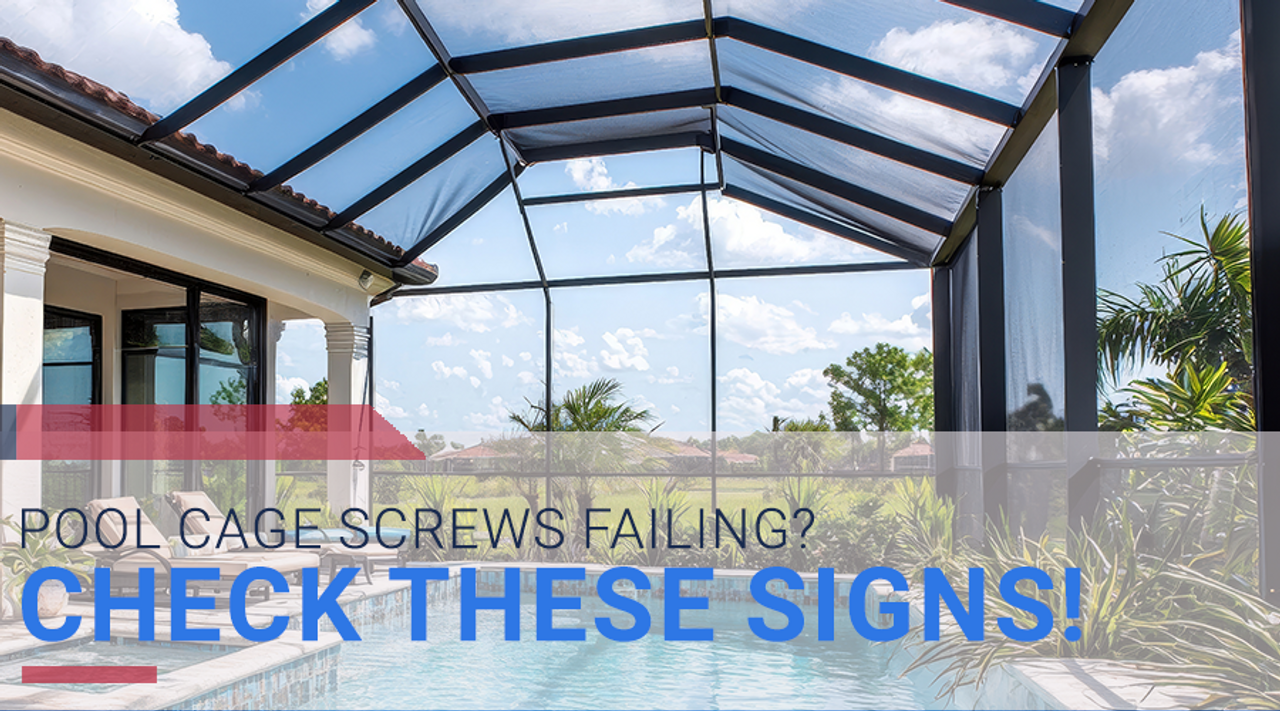Your pool enclosure is more than just a frame around your outdoor space—it’s a vital barrier that keeps bugs, debris, and harsh Florida weather at bay. The screws and fasteners holding this structure together may seem small and insignificant, but they play a crucial role in maintaining your pool enclosure’s stability and safety.
Unfortunately, Florida’s hot, humid, and salty climate can be particularly harsh on metal fasteners. Over time, exposure to these elements causes screws to corrode, loosen, and ultimately fail. The danger is that these problems often start small and go unnoticed until they cause major damage or costly repairs.
Being able to identify the warning signs early can save you both time and money—and ensure your pool enclosure remains secure and looking great for many years. Here are the top five signs that your pool enclosure screws need replacing before it’s too late.
1. Visible Rust or Discoloration Around Screws
One of the first and most obvious signs that your screws are deteriorating is the appearance of rust or discoloration. Rust typically shows as orange or brown staining on or around screw heads.
This rust is a clear indicator that corrosion is taking hold. Once corrosion begins, it slowly eats away at the metal, weakening the screws’ structural integrity. What may start as a minor cosmetic issue can quickly escalate to a safety hazard if not addressed. Rust can also spread to the surrounding aluminum frame or even the screen mesh, causing additional damage.
Regularly inspecting your enclosure for rust can help you catch problems early and plan timely replacements.
2. Loose or Wobbly Screws and Panels
If you notice parts of your pool enclosure feeling loose or shifting more than usual, it’s often a sign that the screws holding them are failing. Rust and corrosion can degrade screw threads, reducing their grip and allowing panels to wobble or become misaligned.
Loose screws compromise the overall strength of your enclosure and can lead to screen tears or gaps where insects and debris can enter. This also increases the risk of damage during storms or high winds, which are common in Florida.
When inspecting your enclosure, gently check panels for movement and tighten any loose screws. If screws won’t tighten properly, they likely need replacing.
3. Screws Breaking or Snapping During Repairs
Attempting to remove or tighten screws should not result in them breaking or snapping. If this happens, it means the metal has become brittle and weak from corrosion.
Broken screws can make repairs more complicated and expensive, especially if the remaining pieces are difficult to remove. It’s a clear sign that the fasteners have reached the end of their lifespan and need full replacement.
Using corrosion-resistant, true stainless steel screws will help prevent this issue in future repairs or installations.
4. Rust Streaks or Stains on Aluminum Frames or Screens
Rust stains on your pool enclosure aren’t limited to the screws themselves. When screws corrode, the rust can bleed onto the surrounding aluminum frames and screens, leaving unsightly streaks and spots.
These stains not only look bad but can also indicate deeper corrosion problems. Aluminum itself doesn’t rust but can suffer from oxidation and deterioration when exposed to rust-causing elements in contact with corroded screws.
Early removal and replacement of rusty fasteners can prevent this staining and preserve the clean appearance of your enclosure.
5. Difficulty Installing Replacement Screws or Stripped Threads
If you’ve already begun the process of replacing old screws but find new fasteners don’t fit properly or the threads strip easily, this is a warning sign that the holes are damaged or enlarged due to corrosion.
Damaged holes reduce the holding power of new screws and may require professional repair or specialized fasteners designed to restore a tight fit. In some cases, fastener protection systems that include sleeves and caps can help repair and reinforce these areas while preventing future corrosion.
Conclusion
Ignoring the warning signs of fastener corrosion can put your pool enclosure at risk, leading to loose panels, increased pest access, safety hazards, and costly structural repairs. By staying vigilant and acting promptly when you see these signs, you can protect your pool screen and extend its lifespan.
Replacing old, rusted screws with corrosion-resistant, true stainless steel fasteners designed for Florida’s climate is one of the best investments you can make for your outdoor space. Florida Fasteners Direct offers high-quality fasteners and protection kits to help keep your pool cage secure and looking great year-round.
Don’t wait for small issues to become expensive problems. Browse our selection of corrosion-resistant homeowner kits today and safeguard your pool enclosure against Florida’s harsh weather conditions.

